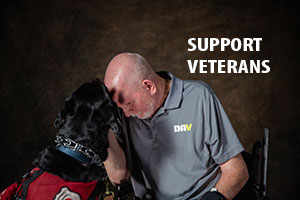Who is considered a Vietnam-era veteran?
The United States began its involvement in the Vietnam War Aug. 5, 1964. The era ended May 7, 1975, by order of President Gerald Ford. During the 11-year campaign, approximately 2.7 million American men and woman served; of those, 58,220 died and 153,000 were wounded. Today, there are fewer than 850,000 living Vietnam War veterans, many of whom who are eligible for VA benefits.
What benefits are available for Vietnam War veterans?
Vietnam War veterans are eligible for benefits that are open to all U.S. military veterans, including but not limited to disability compensation for service-connected disabilities, such as post-traumatic stress disorder and amputations; pension; health care; loans; and insurance. Vietnam War veterans may be eligible for disability compensation for exposure to Agent Orange.
What is Agent Orange exposure?
Agent Orange is an herbicide, consisting of a mixture of chemical defoliants, used by the U.S. military in Vietnam and the Korean Demilitarized Zone. During Operation Ranch Hand, the U.S. military spread over 19 million gallons of Agent Orange over forests in Vietnam and Laos to lure out Viet Cong troops. The operation lasted from 1962 to 1971, causing the exposure of many U.S. military personnel and Vietnam locals to the harsh chemicals, including dioxin, that later caused many health issues and diseases.
The Department of Veterans Affairs presumes Agent Orange exposure for any veteran who served either:
- In Vietnam between Jan. 9, 1963, and May 1975, to include brief shore visits or service aboard ships operating on Vietnam’s inland waterways.
- In or near the Korean Demilitarized Zone between April 1, 1968, and Aug. 31, 1971.
Veterans who served outside the specific time periods or locations may still be eligible for service-connected exposure, including those who:
- Served on or near military bases in Thailand during the Vietnam era.
- Served at herbicide testing or storage facilities outside Vietnam.
- Served as crew members aboard C-123 planes flown after the war.
- Were associated with Defense Department projects to test, store or dispose of herbicides in the United States.
Over the years, presumed exposure to Agent Orange has expanded to include veterans who served aboard certain U.S. Navy and Coast Guard ships. Additionally, some children of veterans with Agent Orange exposure were born with birth defects. They may also be entitled to VA benefits for their conditions.
See the full list of ships associated with possible exposure
Learn more about birth defect disability compensation
What diseases are associated with Agent Orange exposure?
Along with serious health issues such as cancer, tumors, birth defects, rashes and psychological symptoms, Agent Orange has also been known to cause many other presumptive diseases, meaning the VA recognizes them as serviceable for Agent Orange exposure compensation.
Learn more about diseases associated with Agent Orange
How can I apply for VA benefits?
Veterans of any era who were injured, fell ill or suffered a trauma during their time in the military may wish to file a claim for disability benefits through the VA in order to have that condition verified as service connected and become eligible for necessary health care coverage.
It can be helpful to enlist a professional benefits expert to guide you through the process. Many, like those at DAV national service offices, provide their expertise and service at no cost to the service member, veteran, survivor or their family. Current military members looking for assistance as they separate from service can visit one of DAV’s transition service offices.
DAV also has over 1,200 local chapters and departments, and most are staffed by trained veteran experts who can help facilitate your claim.
Find your local DAV national service office
Find the nearest transition service office
What resources are available for veterans who struggle with Agent Orange exposure?








